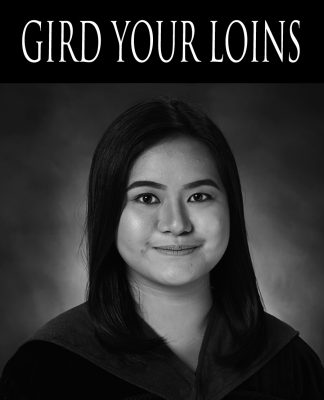>
THE COLLEGE of Education has launched an English-speaking campaign following that of the Faculty of Arts and Letters, to the “shock” of most students.
The announcement came as UST ranked the lowest in the teaching of English and Literature among the top four Philippine universities in the recent survey of London-based consultancy Quacquarelli Symonds (QS).
All professors, students, and support staff in the college have been requested by the Education Student Council (ESC) to communicate in English both in and out of the classroom—including during class recitations, reports, consultations, programs, and office transactions.
However, speaking in English is not required, but “encouraged,” ESC President Romel Bautista said.
The campaign was based on comments from accreditation officials, who had noted that while the college is a “Center of Excellence,” students remain reluctant to communicate in English.
“Everyone was present during the college Mass [when the campaign was announced] and I think they were amused. But of course, students were shocked,” Bautista said.
The campaign also aims to “ignite the pride” of Education students who feel a “collective inferiority” to other courses in the University because “most people in our society do not look up to teachers.”
In the 2011 QS survey, UST placed in the 100 to 150 bracket in terms of English education.
The University of the Philippines topped Philippine schools at 34th place, while Ateneo de Manila followed at 35th place. De La Salle University placed in the 51 to 100 bracket.
Last year, a similar policy was implemented in the Faculty of Arts and Letters (Artlets) as a pilot-test before a University-wide campaign.
The English campaign was initiated by Artlets Dean Michael Anthony Vasco in response to employers’ complaints that Thomasian graduates were not very articulate in English.


















I am an alumnos at the College of Education where I finished my BS Tourism degree. My take on this matter is that this college has got what it takes to successfully practice this new policy. When I read in the past in the Varsi about the Faculty of Arts and Letters decision to adopt such a policy several months ago, I was not at all surprised. Though some may have raised their eyebrows on this new policy, I did not, not at all. I knew that thomasians can speak and write well english or filipino and so, it didn’t come to me as “shocking.” Now, it’s the College of Education’s turn to adopt this policy and again I am not at all shocked or surprised. After all, this college wouldn’t be proclaimed as COE by CHED if thier students are not capable of fluent english. They are good in communication this I can say of College of Education students especially that they are groomed to become effective teachers someday. One cannot be an effective teacher with mastery of the subject matter alone. I congratulate the college for coming up with this policy as it is another way by which they try to raise the bar of excellence that they have set for their themselves for the benefit of their students.
UST should also raise the bar and only accept students with above average English language proficiency, as we seem to have too many students with low English proficiency (and apparently Math, Science and IQ Test scores) to begin with. while we want to improve their English, a policy like this may inhibit learning, especially if the students do not have the capacity to understand English much. sure, we should take pride in training students, but that shouldn’t mean lowering our standards (and accepting them apparently mostly, if not only, for their tuition’s worth).